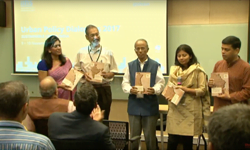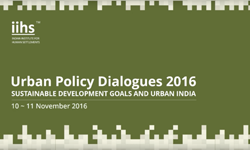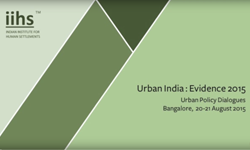Events
Urban Policy Dialogues (UPD)
Urban Policy Dialogues 2023
Discussions during the 9th edition of UPD will be on Urban India: Policy Cornerstones for the Next Leap. The focus will be on six themes that are set to determine the future course of Indian cities: economic growth and development policy; deepening governance and administrative reforms; public and municipal finance; improved land management; re-imagining infrastructure as service; and, promoting green innovation.
Urban Policy Dialogues 2022
Indian cities have a key role in realising the country’s ambitious economic, developmental and environmental goals. However, given the serious legacy and emergent challenges they face, there is need for reflection on agendas Indian cities need to prioritise and pursue.
Discussions during the IIHS Urban Policy Dialogues (UPD) 2022 will explore Pathways towards Future-ready Indian Cities. The focus will be on five themes that will determine the preparedness levels of Indian cities to power rapid, equitable, and sustainable growth and development.
Urban Policy Dialogues 2021
The COVID-19 pandemic has wreaked havoc across India, deepening poverty, inequality, and structural vulnerabilities. This underscores the need to re-examine past development choices and strive for healthy, sustainable, and inclusive cities, urban areas, and rural communities. The 2021 Urban Policy Dialogues (UPD 2021) places the urban as central to new imaginations of post-pandemic futures and many reconfigurations of policy and practice to realize them.
Urban Policy Dialogues 2016
In 2014, the Indian Institute for Human Settlements (IIHS) organised the first iteration of the annual Urban Policy Dialogues, as India’s flagship urban policies were being formulated. The 2015 Urban Policy Dialogues deliberated upon the challenges and innovations with the theme ‘From Policy to Implementation’.
With the launch of the UN Sustainable Development Goals in September 2015, the Urban Policy Dialogues 2016 will bring together policy makers, practitioners, academics, researchers, and representatives of civil society, to deliberate on the Sustainable Development Goals and Urban India.
The Urban Policy Dialogues 2016 focusses on six themes: Housing, Water and Sanitation, Energy, Land, Climate Change, and Risk and Resilience. The above thematic Groups shall deliberate on India’s current development policies and the SDG targets, and explore implementing and monitoring frameworks and processes.
Urban Policy Dialogues 2015
With the launch of national flagship policy programmes in June 2015, the UPD 2015 is themed to help address the challenges of effective implementation on ground. The theme, therefore, was “From Policy to Implementation.” The focus of the two-day event was on translating policies to action and impact on the ground, and assessing what can enable or hinder this translation. In a particularly dynamic urban policy moment, this is a critical focus as several urban programmes are transitioning into implementation mode.
The workshop was organised around four cross-sectoral themes specific to implementation challenges. Participants engaged with these themes as they apply within and affect five sectors of urban practice.
Urban Policy Dialogues 2014
The Rockefeller Foundation – IIHS Urban India Policy Support Partnership (2012-14) situates India’s urban transformation in the context of current governance, economic, socio-political, ecological and cultural trajectories. This is an attempt at engaging with policy concerns that span the growth-equity-resilience-transformative development spectrum, especially when viewed against the landscape of the Global South.
The IIHS has been in the process of researching and producing a set of working policy papers, teaching-learning material and digital interviews, that are directed towards addressing questions around India’s urbanisation challenges. These are targeted at national, state and city policymakers, learners, researchers, practitioners, entrepreneurs, as well as civil society leaders in India.
The Urban Policy Dialogues comprise a series of events under the Urban India Policy 1 Support Partnership.
National consultation on COP21 implications for India and on multiple knowledge systems
IIHS-ASSAR national consultation held on 15 March 2016 and 16 March 2016 at Delhi. It brought together a select set of thought, policy and practice leaders from government, academia, civil society and practitioners to reflect on some of the key climate change related discourses taking ground in the Indian policy landscape. The intention was to understand the relevance of these discourses in the context of the regional research plan.
Resilient Cities and Transformative Adaptation
IIHS organised a roundtable discussion on ‘Resilient Cities and Transformative Adaptation’ on 6 January 2016, as part of knowledge dissemination from the project. The roundtable was organised as part of the INSEE conference jointly hosted by the Indian Institute of Sciences (IISc), Ashoka Trust for Research in Ecology and the Environment (ATREE) and National Institute for Advanced Studies (NIAS). The panel included several eminent scholars and practitioners in the country and was facilitated by Aromar Revi.
Course on Understanding Vulnerability: Concepts, Methods, and Applications for Development Planning
The research team at IIHS conducted a three-day course on vulnerability concepts and methods between 10 December 2015 and 12 December 2015. The 34 participants were funded by the ASSAR project at IIHS. The course brought together participants from various backgrounds and disciplines ranging from students, state and local government authorities to urban planners, development practitioners, and corporate social responsibility representatives. Multiple objectives formed the basis for the course: sharing knowledge on vulnerability, engaging with a diverse audience, and building capacity among participants as well as facilitators through exchange of experiences and knowledge.
Transformative Scenario Planning Workshop: Bengaluru, Water and Us
The workshop was conducted on 19 July 2017 and 20 July 2017 at Bengaluru. It brought together 26 stakeholders comprising municipal officials, community leaders, academic experts, NGO representatives, representatives of private organisations, artists and entrepreneurs. The participants presented their concerns about water in Bengaluru City. The key concerns discussed were wastewater reuse, quality and quantity of groundwater, impacts of climate change, regional water resource management and allocation, governance of water resources, political will, citizen engagement for water conservation and pollution of water bodies.
Experiential Learning Workshop
The workshop was conducted from 8 to 10 May 2017 at Bengaluru.The aim of the workshop was to develop games for different audiences to communicate difficult and complex concepts and issues. This was done in the context of ASSAR research in India, specifically in Maharashtra, Tamil Nadu and Karnataka. Although the content is ASSAR specific, it was useful for anyone interested in learning about concepts of Experiential Learning.
ASSAR Capacity Building and Data analysis meeting
Linking Land-cover and Land-use to Ecosystem Services over space and time, ASSAR Capacity Building and Data analysis meeting was held from 27 March 2017 to 5 April 2017 at Bengaluru. The purpose of the workshop was to enhance the capacity of key researchers to interpret Land Use/Land Cover and Climate Change data for their regions in terms of changes in availability of Ecosystem Services, adaptive capacity and adaptation under climate change.
3rd National ASSAR Consultation
IIHS hosted the third National Consultation on Climate Change Responses as part of the ASSAR project on 23 March 2017 and 24 March 2017 at New Delhi. The consultation focused on the implications of the 1.5 ⁰C global temperature limit and associated decarbonisation and adaptation pathways for India. It used outcomes of the ASSAR project as an entry point to unpack responses to the adaptation challenge. The conversations contributed rich insights to an on-going exploration of the emerging dynamics on climate policy in India.
Cross-CARIAA Dialogue on Economics of Adaptation
Researchers from IIHS and other ASSAR partner organisations from India and Africa participated in the Cross-CARIAA Dialogue on Economics of Adaptation held at New Delhi from 9 January 2017 to 13 January 2017. There were several presentations by teams from ASSAR, HI-AWARE, PRISE & DECCMA at sessions introducing the research context, as well as economics methodologies such as Household Surveys, Input Output Models, and Cost Benefit Analysis.
IIHS was instrumental in leading two sessions: ‘Migration’ and ‘Use of surveys as an instrument to understand adaptation options/pathways’. Important framing issues, with economics as a lens, were discussed during the dialogues.
Research into Use (RiU) training workshop
RiU workshop was conducted from 10 August 2015 to 12 August 2015 at Bengaluru by Jesse DeMaria Kinney of Oxfam for the South Asia RRT at IIHS. Participants at the workshop revisited their stakeholder maps and conducted power analysis exercises. A training session on Oxfam’s Vulnerability and Risk Assessment (VRA) methodology also formed a part of the workshop, which built capacity among the participants in using the tool.
Second National Stakeholder Engagement Consultation
The objective of this consultation was to share preliminary findings from the diagnostic research around selected sub-regions in India and seek critical inputs for the next phase of regional research, particularly on research and information gaps. This event was held in the national capital city of New Delhi on 17 April 2015 and 18 April 2015 in order to engage with national policymakers and influencers. The discussions around the themes of the RDS report: Climate Change – Trends and Projections; Risks, Impacts, and Vulnerability; and Adaptation – development Spectrum, elicited insightful comments and inputs from the participants, which helped the team develop their research focus in the RRP phase. The fourth session on ‘Collaborative Networks and Mainstreaming Adaptation in Policy and Practice’ discussed how the work could be taken forward to develop national networks in the climate adaptation space that could then influence policy and practice at scale.
The International Consultation on Climate Change Adaptation in India and Africa
IIHS hosted a one-day stakeholder engagement event on 9 October 2014. The international Consultation on Climate Change Adaptation in India and Africa brought together over 50 national and international participants from government, academia, civil society, researchers and practitioners to deliberate on the challenges and opportunities of adaptation at scale in India and Africa. ASSAR consortium members were also present at the event.
Indian Urban Conference 2011: Evidence and Experience
The IIHS in partnership with Yale and JCCD and with the support of the Ministries of Urban Development and Housing and Urban Poverty Alleviation of the GoI, IDFC and HUDCO organised India’s largest urban conference of 2011 bringing over 600 delegates together at the Infosys campus in Mysore.
The back-to-back Delhi Policy conference initiated a discussion on how to measure, monitor and support urban development in India at Vigyan Bhawan. The programme brought national, state and city-level policymakers and other stakeholders who have intimate knowledge of the evidence gaps and institutional challenges in urban development together. It was addressed by the Union Ministers for Urban Development, Rural Development and Housing and Poverty Alleviation and the Deputy Chairperson of the Planning Commission. The IIHS research publication Urban India 2011 was released at this Conference.






